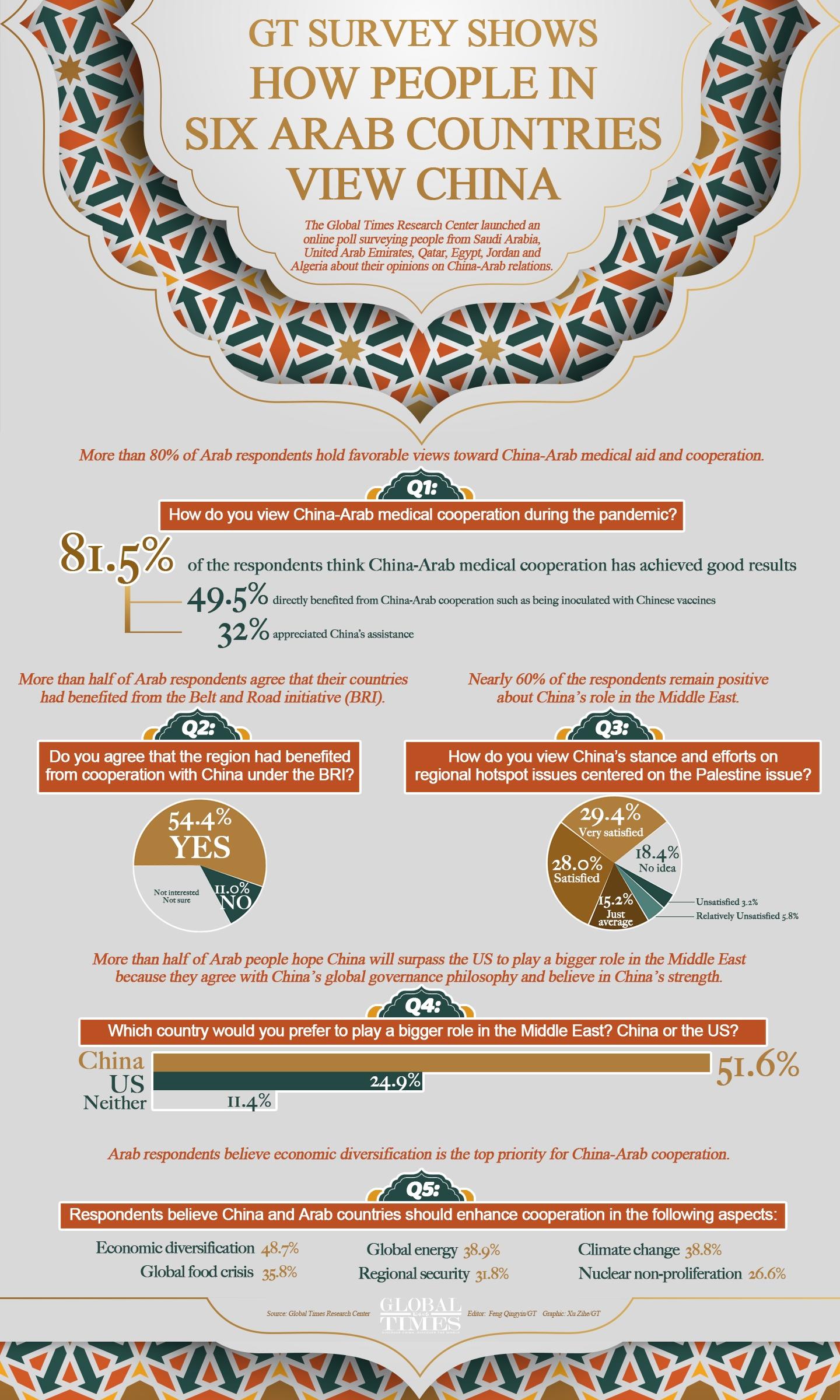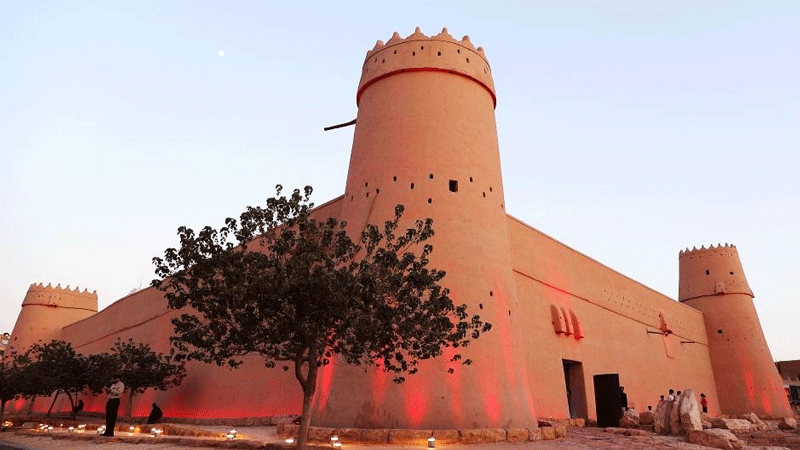70 percent of Arabs anticipate closer ties with China: GT poll

People visit an exhibition themed China-Arab friendship and cooperation in Riyadh, Saudi Arabia, on December 7, 2022, its opening day. There are 103 rare photos from the archives of China’s Xinhua News Agency on display, illustrating the achievements of cooperation and exchanges between China and Arab countries in economy, society, culture, the fight against COVID-19 and humanitarian aid. Photo: Xinhua
With the world paying close attention to China-Arab relations as the two sides further promote their friendship this week, a latest poll showed that over 70 percent of more than 5,000 respondents in China and Arab countries agree with “closer China-Arab” relations in the future, while China is also chosen by most Arabs as their “friend” among major powers in the world.
As US and Western development models have been losing appeal in the Middle East, more Arab states are eager to learn from China's path to modernization. Also, compared with the US and some Western countries that have brought only turmoil and chaos to the region, China has brought more development opportunities, analysts said.
This poll, which was jointly conducted by the Global Times Research Center and School of Arabic Studies of Beijing Foreign Language Studies University, was based on membership database sampling. It processed 5,100 valid questionnaires from respondents aged from 18 to 70 years old in cities across China and six Arab states - Saudi Arabia, UAE, Qatar, Egypt, Jordan and Algeria from November 8 to 25.
The questionnaires are made up of three parts – how much Chinese and Arabs know about each other; how Arabs see China-Arab relations, and how Chinese people think about bilateral relations. It included detailed questions on respondents’ attitudes toward China-Arab relations, their understanding of relations with other countries and also on the channels for the peoples to know each other and how they value future cooperation.
The poll was released against the backdrop of the China-Arab States Summit which will be attended by Chinese President Xi Jinping on December 9. Observers hailed it as a watershed moment in China-Arab ties, and both China and Arab countries are eager to take bilateral relations to new heights.
Previous polls on China-Arab ties were mostly conducted by Western countries and may have been swayed by other geopolitical reasons. However, this poll has got rid of these constraints, allowing both Chinese and Arabs to have a better and clearer knowledge of each other and their collaboration, laying the groundwork for future personnel and commercial exchanges, Liu Xinlu, dean of School of Arabic Studies of Beijing Foreign Language Studies University, told the Global Times.
Close friends
The questionnaires sent to Arab and Chinese respondents began with questions on how well they know each other. Over 70 percent of Chinese and Arab respondents believe they have some knowledge of each other, while more Arab respondents believe they are very familiar or relatively familiar with China. The poll shows that 42.8 percent of the respondents in Arab states have had contact with China, including paying visits to China or having Chinese friends.
Arabs have growing awareness of China, since Chinese products have become indispensable in their everyday lives, Li Shaoxian, head of the China Institute for Arab Studies at Ningxia University, told the Global Times.
More elites and government officials have also visited China to learn from China's experience in development, according to Li, noting that as interactions between China and Arab countries grow, an increasing number of Chinese people are becoming more interested in the Arab world.
The long Chinese civilization is the historical and cultural foundation for the Arab world's understanding of China. Furthermore, China has made significant progress since opening-up and reform, and has enjoyed expanding global influence, Liu Zhongmin, a professor at the Middle East Studies Institute of Shanghai International Studies University, told the Global Times.
Experts said that for the past 10 years, news on China has appeared more frequently in Arab media. Arabs' understanding of China has changed, particularly in recent years, from focusing on China's rapid economic development to its development pattern.
According to the poll, Arabs are very interested in participating in bilateral educational cooperation programs. 79.1 percent of Arab respondents are interested in studying in China or participating in language and other programs provided by Confucius Institutes. According to analysts, there has been a growing trend in several Arab states of studying Chinese, and Chinese movies and TV shows are becoming popular in the region.
As the situation in the Middle East has wide implications, the poll also demonstrates how Arabs view international relations. Data shows that Arab respondents’ attitudes toward major countries were varied. Among major countries including China, Russia and the US, proportion of Arab respondents who see China as a friend is the highest in this poll.
Liu Zhongming noted that the legacies of British and French colonialism and the turmoil resulted from US' hegemony have given these Western nations and the US a terrible reputation in the Arab world.
China and the Arab world, on the other hand, have a long history of cordial interactions along the Silk Road and share a common destiny of seeking national revolution and preserving sovereignty. Since China's opening-up, bilateral collaboration has grown significantly, particularly through the Belt and Road Initiative, and more Arabs now consider China a friend, said the expert.
Nearly 60 percent of Arab respondents agree on China’s role as a builder in Arab regions, with people from Qatar and Egypt giving the highest approval rating, while more than 60 percent of Chinese respondents see Arab states as supporting and benefiting from the Belt and Road Initiative.
Despite the differences in situations in the 22 Arab states, China's constructive role in the Arab world has been evident, and Arab states have received tangible benefits, particularly under the Belt and Road Initiative, said Li, noting that by sharing high-technologies on new energy and artificial intelligence, China is helping Qatar and other wealthy Gulf countries diversify their economic plans, and China is also assisting Egypt and other Arab countries with their infrastructure construction.
While 76.7 percent of the Arab respondents think China’s development will bring opportunities to the Arab world, one percent think China will pose a threat, mentioning the impact on culture, economy and regional security. It is not strange to see this, as Chinese products which are attractive in price and quality may impact local producers, but the mainstream public in Arab states agree that exchanges with China have brought more benefits, and more see China’s development as an opportunity for the Arab world, analysts said.
High anticipation
More than 75 percent of Arab respondents believe China can offer valuable governance experience to the Middle East. 46.9 percent of them agree that it is China that has played a positive role in regional issues while only 23.7 percent of respondents selected the US.
The Chinese approach of achieving enormous economic success while maintaining stability appeals to Arab states. The multi-party system that was adopted in the US and many Western nations has failed in the Middle East over the last decade, and Arab states are seeking to learn from China's growth path. Many polls conducted in the US and Arab nations also revealed that the US and Western development styles are losing favor, while the Chinese method is gaining popularity, Niu Xinchun, director of the Middle East Institute of Contemporary International Relations, told the Global Times.
The "Looking East" approach first emerged in the Arab world at the end of the past century, but its core has steadily altered as the Arab world pays more attention to China in more fields, Liu Xinlu said, noting that Arab countries share the desire for national rejuvenation, and have learnt from the West with little success.
The primary reason for Chinese modernization is its ability to integrate lessons from other nations with its own context - this is important experience that Arab states can use in striving for their own growth, said Liu Xinlu.
On the question of which fields Arabs hope China will be involved in when it comes to Middle East governance, the survey finds that 39.4 percent want China to support regional sustainable development, 36.6 percent want China to counter US influence, and 26.4 percent want China to mediate in the Palestinian issue.
Security in the Middle East has been seriously weakened in recent years as a result of the US' strategic retreat from the region and the aftermath of the Arab Spring. Against this context, observers say China's appeal to construct a shared, comprehensive, collaborative, and sustainable security mechanism in the Middle East has provided a new pattern to assist the region in overcoming its security challenges.
Liu Zhongming said that China has also contributed to improving the region’s security environment, such as participating in peacekeeping efforts. These stand in stark contrast to the US' attempts to use military force to incite conflict in the region.
Promising future
More than 71 percent of Arab respondents expect deeper relations with China in the future, with 43 percent anticipating expanded collaboration and 28.2 percent believing Arab countries need China's help and cooperation in regional and global issues. The poll also finds that 44.5 percent of Arab respondents anticipate economic collaboration with China. The US and Japan are identified as the second and third countries with whom the Arabs want to collaborate.
According to Liu Zhongmin, the reason China is the most popular is that its economic cooperation with other countries has no political conditions attached, and it will not exert pressure on other countries for its own interests, which is why the Belt and Road Initiative has been widely welcomed. Furthermore, China's enormous potential in not just economic growth but also high technology is also attractive to Arab governments.
Meanwhile, more than 80 percent of Chinese respondents also recognize the importance of Arab states to China, as they are significant trade partners and have played an important role in helping China ensure energy security and support China’s stances in international platforms.
Due to the US' blockade, China has found itself in a changed international context, with Arab states playing more prominent roles in China's foreign relations. Cooperation with Arab countries could not only enhance high-quality Belt and Road Initiative building, but would also assist China in mitigating external dangers.
China-Arab relations are significant in terms of politics, economy, and long-term prospects, according to Li, who noted that China-Arab cooperation has a long history and will be promoted to a historically high level, particularly following the China-Arab States Summit this week, and bilateral relations will deepen in every successful form of cooperation in the future.

GT survey shows how people in six Arab countries view China. Editor: Feng Qingyin/GT Graphic: Xu Zihe/GT

GT survey shows how Chinese people view China-Arab relations. Editor: Feng Qingyin/GT Graphic: Xu Zihe/GT
Photos
Related Stories
- Feature: Xi's reply encourages Saudi students to devote to Saudi-China friendship
- Belt and Road cooperation promotes building of China-Arab community with shared future
- Popular Chinese TV series bring positive life attitude and joy to Arab audiences
- Photo exhibition in Saudi Arabia marks friendly ties between China, Arab states
- Visit further cements Sino-Saudi ties
Copyright © 2022 People's Daily Online. All Rights Reserved.









